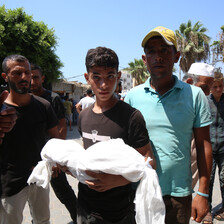The Electronic Intifada 11 October 2024

Hadeel Dorraj’s daugther nurses her injuries after getting treatment.
At least 28 people were killed and over 50 people were wounded on Thursday in a horrific Israeli attack on a girls’ school turned shelter for the displaced in Deir al-Balah in the central Gaza Strip.
The attack on Rufaida Girls’ High School was the third Israeli attack on schools in Deir al-Balah over the past week – the others were on the Ahmed al-Kurd school on 5 October, and al-Ayesha school on 3 October.
In total, at least 30 people were killed in the three attacks and nearly 100 people were wounded.
The strike on Rufaida quickly overwhelmed the nearest hospital, the al-Aqsa Martyrs Hospital in Deir al-Balah.
Dr. Khalid Abu-Habel was on duty when ambulances started bringing dozens of wounded people from the Rufaida school attack to the emergency department.
Abu-Habel, who has been treating the injured almost non-stop at the hospital for the past 12 months, described the situation as “heartbreaking” and “unimaginable,” and said most of the victims had been women and children.
“It was a day full of blood and tears,” Abu-Habel said. “Many corpses. Here, there and everywhere inside. Dozens of wounded arrived, and we don’t know how to deal with them.”
The doctor lamented the conditions under which he is working.
“We’re working with the bare minimum to treat tens of cases daily from Israel’s relentless attacks. We lack medical supplies, medicines and medical devices.”
Many of the wounded require critical and urgent medical care and assistance that, Abu-Habel said, is simply not possible in Gaza’s battered, overstretched and under equipped medical facilities.
“We need to stop this horrific war right now,” he told The Electronic Intifada. “The mass slaughter of civilians and these heartbreaking scenes can’t continue,” the doctor said of an Israeli genocide that has killed more than 42,000 people since last October.
Pools of blood
Hadeel Dorraj and her 10-year-old daughter were sheltering in a classroom in the Rufaida school when it was struck by Israeli warplanes in the early afternoon. Shrapnel cut her daughter’s leg and neck.
“We suddenly heard a massive blast that rattled the classroom. We couldn’t see anything at all. I hurried to find my children and my family,” she said.
She found her daughter injured and went to get help only to be confronted by a scene of pure horror.
“The courtyard of the school was just pools of blood and body parts,” Dorraj told The Electronic Intifada. “People were sliced in half.”
According to an Al Jazeera report, the Israeli army claimed – without evidence – that the strike targeted Hamas fighters operating from a so-called command-and-control center inside a compound in the school.

Saaed Mahmoud catches his breath outside al-Aqsa Martyrs hospital on 10 October after helping salvage wounded people from Thursday’s Israeli attack on a nearby school that killed at least 28 and injured over 50.
But any such explanation would be utterly rejected by Dorraj, who, “after hours of searching,” eventually found another of her relatives. Or at least part of that relative.
“We were able to identify our relative when we identified her two buried legs beneath the debris. That’s all we found.”
She said the school was filled with ordinary people seeking safe shelter.
“We are humans who want only to live,” she said. “Our life is not a life at all. Unfortunately, it’s just getting worse and worse every day.”
Dorraj now joins the many hundreds who have been forced to leave the school.
“We’re now displaced again,” she told The Electronic Intifada. “There’s no place to go. We’ve been struggling from day one. We can’t afford to live and continue to resist in these hellish circumstances. I can’t fathom the pain anymore.”
Only a few remained intact
Saaed Mahmoud had been living in a makeshift tent in front of the Rufaida school with his wife and seven children when the school was targeted.
“At around 1 pm, a huge explosion shook the entire area,” he told The Electronic Intifada.
“Huge clouds of smoke enveloped us. We couldn’t see each other. I rushed to find my family and to the people inside the school. I rescued all my children from under the rubble. They were all wounded.”
Mahmoud then also recounted the nightmare of seeing “people’s organs and limbs scattered over the place, blood spattered over people’s belongings, headless children and bodies split apart.”
Like Dorraj he recounted how some people could only be identified by their body parts, “one leg, two hands, some hair, a head or a few fingers.”
Mahmoud said he was still trying to absorb the horror of what he had witnessed and was praying that his wife would be able to recover from what she had seen.
He was also trying to deal with his grief over those killed.
“People I’ve spent a whole year with and with whom I’ve shared my stories and anguish have ended in [body] bags. Only a few of their corpses even remained intact.”
Like Dorraj and everyone else who had sought shelter at the school, Mahmoud said he now doesn’t know where to go.
“Ending up on the street with my family is a slow death,” he said, before wondering out loud why there was no intervention to stop Israel.
“I don’t know when this will end, but it’s an endless trauma.”
Abubaker Abed is a journalist and translator from Deir al-Balah refugee camp in Gaza.





